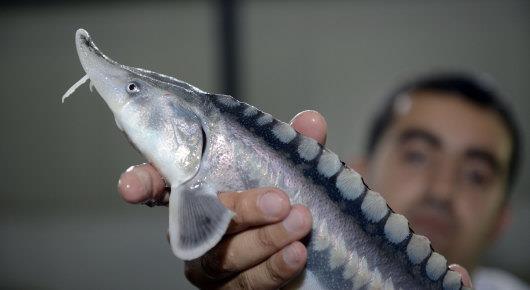Europe’s inland fisheries and aquaculture take center stage

Most European consumers are familiar with migratory species like salmon and sturgeon, and with farmed trout and carp. The long-term viability of these and other inland fish species is the focus of an FAO regional commission whose meeting opens here today.
The European Inland Fisheries and Aquaculture Advisory Commission, established in 1957, promotes responsible management of European inland fisheries and aquaculture – to support sustainable economic and recreational activities and protect the aquatic environment.
As part of its three-day agenda, the Commission will decide on a two-year work plan and discuss a five-year strategy, to better align itself with other FAO commissions, regional initiatives and strategic objectives. The Commission has an important role in supporting governments to achieve the United Nations Sustainable Development Goals – with increased productivity, improved livelihoods and more employment from inland fisheries and aquaculture.
“Inland fisheries are extremely important – for people’s livelihoods, for food security, and for environmental sustainability,” said Victoria Chomo, FAO senior fisheries and aquaculture officer. “Especially inland aquaculture, which has significantly lower greenhouse gas emissions compared to terrestrial meat production. This means that growing and eating more fish protein can help mitigate climate change.”
“Inland aquaculture has significantly lower
greenhouse gas emissions than terrestrial meat production.
This means that growing and eating more fish can help
mitigate climate change.”
Victoria Chomo
FAO Senior Fishery and Aquaculture Officer
According to FAO, global aquaculture production continues to rise, and Asia is the undisputed world leader with 89 percent of total global production. European production has fallen slightly in recent years, despite good potential and access to the latest technologies. Africa and the Americas have been increasing their share of production.
When it comes to inland capture fishing, primary data are scarce for the European region. Many countries still do not monitor, regulate, or require reporting on fishing in their lakes and rivers.
However, FAO has observed a decline in the total commercial catch in Europe in recent years, while recreational fishing has assumed growing importance.
FAO estimates an annual catch across Europe of about 150,000 tonnes – equivalent to 250 grams per person – with the highest per capita figures found in Eastern Europe (1.22 kilos per person), followed by Northern Europe (0.42 kilos per person).
According to FAO, the top 10 European countries in terms annual inland fish catch are: Germany (21,349 tons), Ukraine (20,116 tons), Poland (18,376 tons), Hungary (9,937 tons), Spain (6,000 tons), Romania (4,464 tons), Czech Republic (3,841 tons), Italy (3,800 tons), Serbia (3,150 tons), and Estonia (2,654 tons).
With significant levels of fish consumption, the European Union is among the world’s top fish importers.
The FAO European Inland Fisheries and Aquaculture Advisory Commission provides advice and recommendations, encourages broad participation and communication, and delivers relevant scientific research for the long-term health of inland fisheries and aquaculture in the region.
This week the Commission will review progress on its ongoing projects – including recreational fishing on inland waters, the welfare of fish raised in aquaculture, downstream passage of fish at hydropower dams, and others.
Of special concern, participants will be briefed on the outcomes of the International Symposium on “Adaptation of inland fisheries and aquaculture to climate change,” held in Stare Jablonki in the days immediately preceding the Commission session.
Members of the European Inland Fisheries and Aquaculture Advisory Commission are: Albania, Austria, Belgium, Bosnia and Herzegovina, Bulgaria, Croatia, Cyprus, Czech Republic, Denmark, Estonia, the European Union, Finland, France, Germany, Greece, Hungary, Iceland, Ireland, Israel, Italy, Latvia, Lithuania, Luxembourg, Netherlands, Norway, Poland, Portugal, Romania, Slovakia, Spain, Sweden, Switzerland, Turkey, and the United Kingdom.
6 September 2017, Stare Jablonki, Poland
